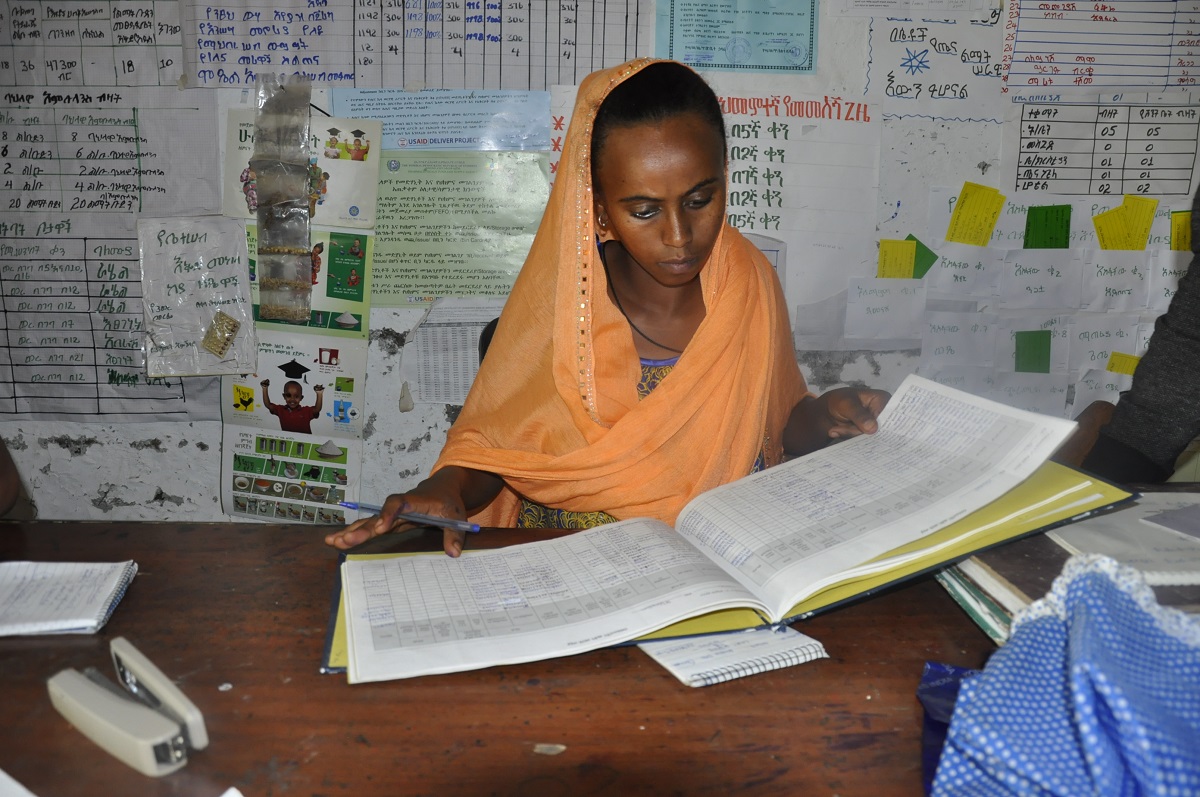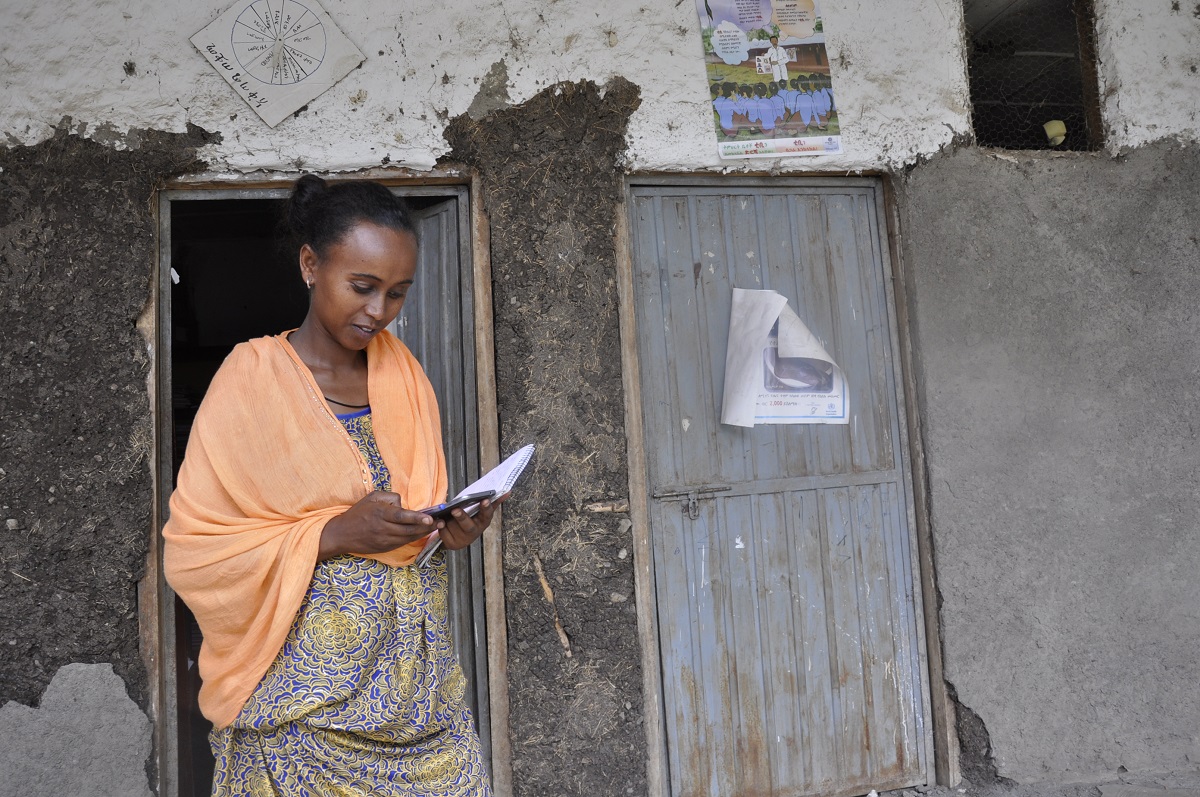Rahel Mengesha is one of the tens of thousands of health extension workers (HEWs) the Government of Ethiopia has trained and deployed all over the country. Based at Asfachew kebele in Tarmaber district of the North Shewa Zone, she provides grassroots health services, which are mainly preventive, to the community.
Rahel has been working at Asfachew kebele Health Post, the smallest health infrastructure in the country, for more than eight years and is well aware of the day-to-day health challenges and needs of the villagers she serves. She conducts outreach to more than 500 households. This year alone, Rahel anticipates providing needed services to 127 pregnant women scattered across 112 households. Most of them have already delivered healthy babies at the nearby health center to which she has referred them, and she currently has 31 remaining pregnant mothers to look after on her roster.
Nearly a year ago, Rahel was introduced to a new and easy to use Mobile Health (Mhealth) application initiated by the UKAID funded ‘Service, Education, and Empowerment’ (SEE) project of Amref Health Africa in Ethiopia. In partnership with Medic Mobile and the government of Ethiopia, Amref has introduced Mhealth, a computerized data processing system. This system is designed to send messages to health workers in charge of pregnant women; this includes updates regarding prenatal check-ups, expected date of delivery, possible danger signs, dates of child vaccination, and other crucial pregnancy related information. Amref rolled out a series of trainings for Rahel and fellow health extension workers, arming them with basic skills on how to operate the system.
Through a simple pop-up message coming to her cell phone, Rahel knows who has a check-up visit and other pregnancy related details. She then contacts leaders of the Women Development Army in her locality to request help in bringing the mothers to the health post. Rahel speaks of how useful the application is, “once I register a pregnant woman for maternal care services, I am able to access her pregnancy related information; I will have all the necessary data recorded on paper, and then will feed it into the system right away. The woman will almost become like a member of my family afterwards. This is simply because the system brings her into contact with me so frequently; it alerts me and keeps me engaged, and makes me sensitive to my everyday task of assisting her.”
Rahel added, “My mobile phone is no longer the same as before. I used to utilize it only for audio calls. If it didn’t ring at all, I might not even know where I put it. I seldom gave attention to messages routinely coming; I regarded the messages as useless-junk texts. Now it is different. Since when I received the mobile health training that Amref Health Africa offered me and started using the system for the service it was intended, my mobile phone has almost become like a close friend, who talks to me, and alerts me every hour to help those who need my assistance. A simple mobile number I saved as ‘Amref’ has changed the way I do my daily job,” Rahel noted.
 This initiative of Amref Health Africa in Ethiopia is an innovative approach to address pregnancy related problems in rural settings. It makes the health workers become vigilant of the pregnant women they have on their care list. “As part of my job responsibilities, I normally keep a record of the dates manually, including expected date of delivery. I should refer to my records every day to see who has a check-up and when; this mobile health application has now made my work easier. I may be busy with other stuff and may forget the check-up visit dates of the pregnant women I look after. No worries, however, because the system will send me a reminder and alert me now and then. Then I immediately contact one of the leaders of the health development army to whom I closely work with to bring the women to the health post, and usher them back home,” Rahel noted.
This initiative of Amref Health Africa in Ethiopia is an innovative approach to address pregnancy related problems in rural settings. It makes the health workers become vigilant of the pregnant women they have on their care list. “As part of my job responsibilities, I normally keep a record of the dates manually, including expected date of delivery. I should refer to my records every day to see who has a check-up and when; this mobile health application has now made my work easier. I may be busy with other stuff and may forget the check-up visit dates of the pregnant women I look after. No worries, however, because the system will send me a reminder and alert me now and then. Then I immediately contact one of the leaders of the health development army to whom I closely work with to bring the women to the health post, and usher them back home,” Rahel noted.
Rahel refers pregnant women to the nearby health center for services beyond the capacity of the health post she manages. The Mobile Health application tells her who she should refer to higher health facilities. She shared her experience in her own words:
“Once, the mobile health application informed me of an estimated date of delivery of one of the women I was looking after. When the woman came to me, she had her face and feet swollen, one of the danger signs during pregnancy. I had to immediately refer her to the nearby health center. The nurse working at the Health Center sent her back home thinking that was less serious signs of danger. She came back to me the next day. The application inquired if I did refer her to the higher health center and kept reminding me that I should. Then I had to send her back to the same health center once again. This time her situation shocked them to the core. They could not help but to refer the woman to Debrebirhan Hospital, where she gave birth to a twin. But as her situation became critical, she was taken to Addis Ababa Black Lion hospital. I am glad she has recovered and met her babies.”
As a young frontline health worker, Rahel is keen to learn more and use any innovative approach like the current Mobile Health application that gives efficient and effective solutions to maternal health challenges her community experiences.
Key Lessons Learned
– Youth clubs have the potential to work independently and effectively to reach a considerable proportion of the target population with minimum operational cost. Therefore, strengthening youth clubs through material support (i.e. basic operational equipment) is critical.
– Operational support and strong coordination between the health system, local government, and local leaders are among the key strategies found to be effective in ensuring smooth implementation of the project activities and sustainable results.
– Offering private waiting rooms and providing YFS by specifically trained staff in designated rooms increased the uptake of SRH related services by young people in the intervention areas.
– The establishment and use of a project advisory committee played a vital role in ensuring achievement of project activities. The project advisory committee holds stakeholders accountable to the project beneficiaries through monitoring and evaluating project progress and performance. These activities of the committee are a practical means to ensure replicability and sustainability of the project.
SEE Project Implementing Partners
Amref Health Africa in Ethiopia; Family Guidance Association of Ethiopia (FGAE); Talent Youth Association (TaYA); Youth Network for Sustainable Development (YNSD)
Amref Health Africa teams up with African communities to create lasting health change.

